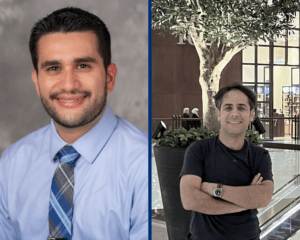The Johns Hopkins University’s Discovery Awards provide grant awards to cross-divisional teams, comprised of faculty and/or non-faculty members from at least two schools or affiliates of the university, who are poised to arrive at important discoveries or creative works. The expectation is that these awards will spark new, synergistic interactions between investigators across the institution and lead to work of the highest quality and impact.
The Ralph O’Connor Sustainable Energy Institute (ROSEI) has partnered with the Provost’s Office to expand the existing JHU Discovery research program and is offering an additional $50,000 on top of the conventional awards for impactful work aligned with ROSEI’s research.
Three Discovery Awards are being co-funded by ROSEI this year, an improvement on 2022 when the institute helped fund two. See below for the titles, abstracts, and brief summaries for this year’s awardees.
Title: Photoelectrochemical Carbon Capture: Using Sunlight to Clean the Air

Susanna Thon (Left), Sara Thoi (Top Right), and Yayuan Liu (Bottom Right)
Principal Investigators: Susanna Thon (Core ROSEI faculty), Sara Thoi (Core ROSEI faculty) & Yayuan Liu (Associate ROSEI faculty)
Summary: The world’s continued reliance on fossil fuels for energy consumption has led to an alarming rate of anthropogenic carbon dioxide (CO2) emissions with severe climate and environmental consequences. Even with a transition to renewable energy sources, CO2 capture will be indispensable in climate change mitigation strategies. This project aims to develop the first photoelectrochemical carbon capture system by leveraging the team’s expertise in solar energy conversion, carbon capture, and advanced multifunctional materials for electrochemistry. Our test solar electrochemical flow cell will aim to use direct solar power to capture and concentrate CO2 from air. Compared to conventional thermal- or pressure-driven carbon capture methods, photoelectrochemical carbon capture processes can operate isothermally and desorb concentrated CO2 at ambient or even elevated pressure, potentially offering an efficient, self-powered solution to mitigate climate change.
Title: Supply-chain-constrained Capacity Expansion for Decarbonized Power Grid

Yury Dvorkin (Left), Bentley Allan (Top Right), and Mahdi Mehrtash (Bottom Right)
Principal Investigators: Yury Dvorkin (Core ROSEI faculty), Bentley Allan (Associate ROSEI faculty), Mahdi Mehrtash (Associate ROSEI faculty), & Dan Ockerman (Applied Physics Lab)
Summary: Supply chains for clean-energy technologies are in a state of rapid and unpredictable evolution, creating uncertainty regarding the availability of materials, components, and manufacturing capabilities necessary for the timely decarbonization of the US electric power sector. This uncertainty poses potential obstacles to the widespread deployment of such technologies as wind power turbines, photovoltaic panels and battery energy storage, potentially leading to increased deployment costs and jeopardizing the achievement of clean-energy goals. The objective of this DISCOVERY project is to systematically understand clean-energy supply chains and integrate them with planning models in the US electric power sector. This collaborative endeavor brings together experts from WSE, KSAS, and APL, leveraging data-informed mathematical modeling to generate managerial insights that could enhance supply-chain robustness and ensure compliance with clean-energy goals.
Title: High-Entropy Capacitive Energy Storage

Corey Oses (Left), Seyed Koohpayeh (Right)
Principal Investigators: Corey Oses (Associate ROSEI faculty) & Seyed Koohpayeh (Affiliate ROSEI faculty)
Summary: With continued miniaturization of electronics and the push for clean carbon-free transportation, electrostatic capacitors with high energy densities are in demand. Having fast charge/discharge speeds, these components are essential for power electronics (electric cars, power trains, planes) and pulse power applications (radar, lasers, fusion reactors). However, capacitors suffer from poor energy densities compared to batteries, limiting their applicability as electronics continue to shrink. The team – having expertise in complex ceramic prediction and synthesis/characterization – looks to investigate how configurational entropy can be engineered to realize more robust and better-performing energy storage materials. New chemistries will be designed offering favorable and stable microstructural features, targeting non-rare-earth compositions in alignment with ROSEI’s mission.